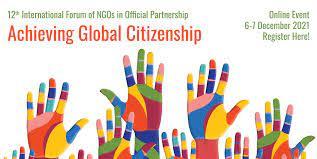
http://www.ngo-unesco.net/forum_global_citizenship.html
file:///C:/Users/FLEX3/Downloads/EN%20Introductory%20Note.pdf
Since 2012, UNESCO has been developing the concept of Global Citizenship. Recognising divergent interpretations which prevent a universal definition or legal status, UNESCO has moved towards a pragmatic approach to Global Citizenship through education (see the Final Document of the Technical Consultation on ECM, “Education for global citizenship” 2013). This approach has led to the establishment of three principles that UNESCO considers crucial: Respect for diversity, solidarity, and a shared sense of humanity. These values, if they are universally shared, can provide the foundation upon which a collective global identity and responsibility can be built.
At the International Conference of NGOs in Official Partnership with UNESCO in 2018, the NGO Partners agreed the importance of this topic, and endorsed a future International Forum on Global Citizenship. With the complications of COVID-19, it was not possible to hold this forum in its initially mandated timeframe, and so the topic was continued into the 2020-2022 Liaison Committee mandate. Global Citizenship is identified in target 4.7 of Agenda 2030, part of Sustainable Development Goal 4.
This target calls on countries to “ensure all learners acquire the knowledge and skills needed to promote sustainable development, including through the education for development and sustainable lifestyles, human rights, gender equality, promotion of a culture of peace and non-violence, global citizenship, and appreciation of cultural diversity and the contribution of culture to sustainable development”.
The work of UNESCO in the field of Global Citizenship is well-established and pre-dates the current terminology – indeed, it dates to the founding of the Organization and the definition of its mandate. Under its Programme and Budget for the 2022-2025 period (41 C/5), UNESCO will continue to encourage the promotion of Education for Global Citizenship (GCED), with a particular focus on democracy and rule of law, addressing racism and preventing violent extremist ideologies, while giving cross-cutting priority to promoting human rights in, for and through GCED.
There remain many obstacles to achieving Global Citizenship and this Forum seeks to address the two priority issues highlighted by the NGOs in Official Partnership when they adopted the topic for this Forum: 1) To find, through common values, the vital link that exists between humans and the nature of which they are part, and 2) To elevate the importance of living together, in a harmonious and interdependent manner.
The previously identified observations noted in the Preliminary Concept Note can be found below, and for this Forum have been taken into account when inviting speakers to participate in this event, with the intention of stimulating debate, and signposting partner NGOs, States, and organisations towards successfully achieving Global Citizenship.
Though each of these observations is important, in opening the Forum we would like to draw particular attention to the critical need for intersectional, diverse, and intergenerational dialogue, which must be fostered and supported by a strong Civil Society if we are ever to move towards a more peaceful, just, and safe global community for all.










Add new comment